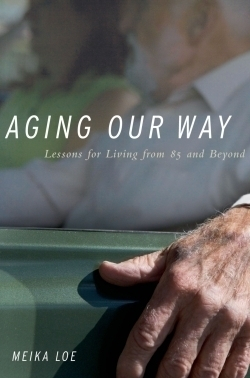Aging Our Way
Lessons for Living from 85 and Beyond
“Little by little, the spirit gets broken here,” says Caro Spencer in May Sarton’s novel As We Are Now, describing her life in Twin Elms. Sarton based the nursing home she’s speaking of on a “disgraceful” facility she visited in New Hampshire, “a place where more than one child has simply abandoned a senile parent, buried him alive.” In the end, Caro decides to burn the house down along with the residents, reasoning that “death by fire” is better than “death by bad smells and bedpans and lost minds in sordidly failing bodies.”
In Aging Our Way, sociologist Meika Loe, from Colgate University, examines the lives of thirty elders, aged 85 to 102, only two of whom reside in a facility. All of them, Loe writes, “believe strongly in autonomy and dignity, and retain control over their day-to-day lives.” One describes an earlier stay in a nursing home as a “dark cold dreary” experience. Another said she would kill herself if she were ever sent to a nursing home. She died at home two months after her ninety-fifth birthday; a relative and two nurses cared for her at home in her final weeks.
Aging Our Way is Loe’s well-crafted answer to the question many ask as they approach the end of their days, “How can one maintain comfort and health, stay at home, and continue to lead a meaningful life?” During her interviews and interactions with the elders over a three-year period, the author finds that “most are solitary the greater part of their days,” relaxing on the porch, watching the world go by or taking on projects—cooking, reading, tending to plants, and writing—that add purpose to life. Yet even as they take pride in living on their own, they reach out to numerous relatives, friends, and assistants for transport, health care, and company.
In the United States, young people get few opportunities to spend time with elders—a national survey in 2009 found that two-thirds of adults aged eighty-five and above live alone rather than with family members. Loe encourages readers to learn “lessons for living, at any age” from elders in their communities. Early in As We Are Now, Caro Spencer remarks: “Old age is not interesting until one gets there, a foreign country with an unknown language to the young, and even to the middle-aged.” Aging Our Way succeeds in making that alien territory less forbidding.
Reviewed by
Karunesh Tuli
Disclosure: This article is not an endorsement, but a review. The publisher of this book provided free copies of the book to have their book reviewed by a professional reviewer. No fee was paid by the publisher for this review. Foreword Reviews only recommends books that we love. Foreword Magazine, Inc. is disclosing this in accordance with the Federal Trade Commission’s 16 CFR, Part 255.

